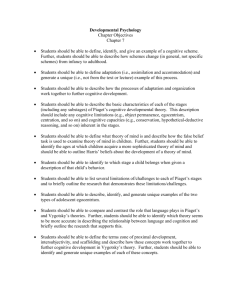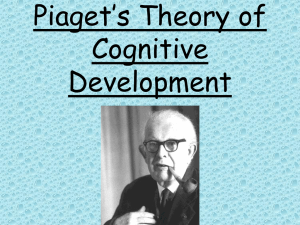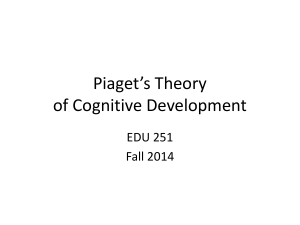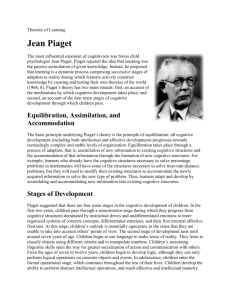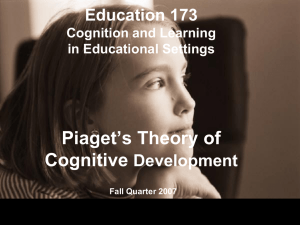pdf b+w
advertisement
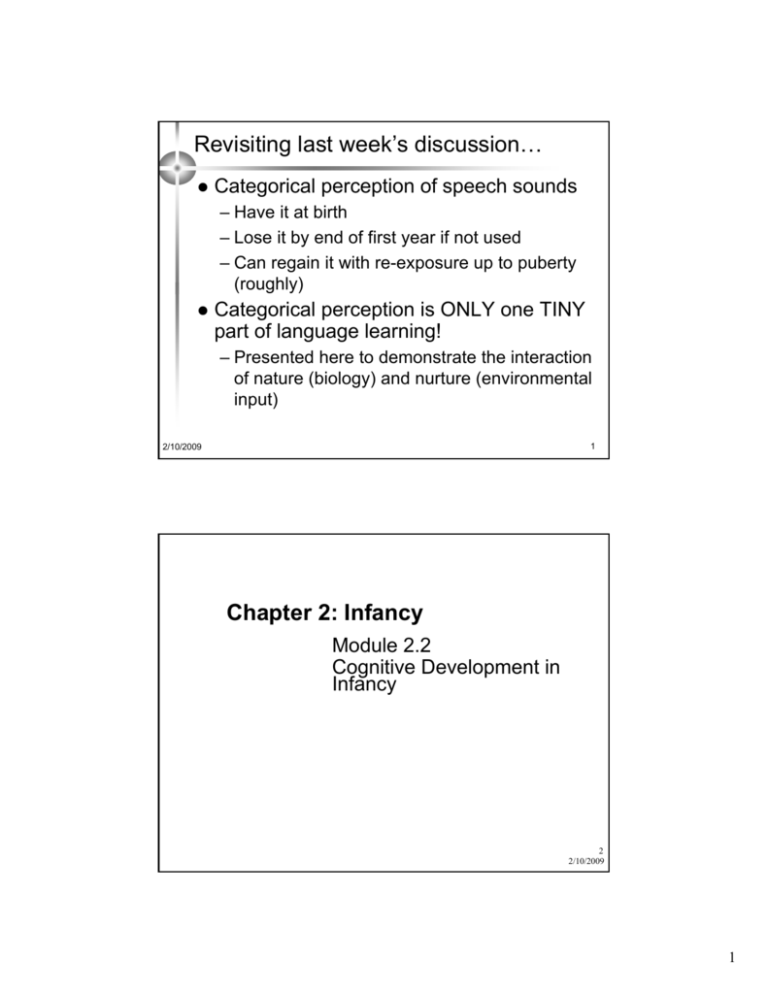
Revisiting last week’s discussion… z Categorical perception of speech sounds – Have it at birth – Lose it by end of first year if not used – Can regain it with re-exposure up to puberty (roughly) z Categorical perception is ONLY one TINY part of language learning! – Presented here to demonstrate the interaction of nature (biology) and nurture (environmental input) 1 2/10/2009 Chapter 2: Infancy Module 2.2 Cognitive Development in Infancy 2 2/10/2009 1 Looking Ahead z What are the fundamental features of Piaget’s theories of cognitive development? z How do infants process information? z How is infant intelligence measured? z By what processes do children learn to use language? z How do children influence adults’ language? 2/10/2009 3 PIAGET’S APPROACH TO COGNITIVE DEVELOPMENT “genetic epistemology”a study of the origins (genesis) of knowledge (epistemology) 2/10/2009 4 2 Key Elements of Piaget’s Theory z Action = Knowledge – Four universal stages in fixed order 5 2/10/2009 Key Elements of Piaget’s Theory z Action = Knowledge – Four universal stages in fixed order – Development = physical maturation and exposure to relevant experiences 2/10/2009 6 3 Key Elements of Piaget’s Theory z Action = Knowledge – Four universal stages in fixed order – Development = physical maturation and exposure to relevant experiences – Schemes adapt and change Assimilation z Accommodation z 7 2/10/2009 What principles underlie this cognitive growth? z Assimilation – Assimilation occurs when the perception of a new event or object occurs to the learner in an existing schema and is usually used in the context of self motivation. 2/10/2009 8 4 What principles underlie this cognitive growth? z Assimilation – Assimilation occurs when the perception of a new event or object occurs to the learner in an existing schema and is usually used in the context of self motivation. z Accommodation – Accommodation is one accommodates the experiences according to the outcome of the tasks 9 2/10/2009 What principles underlie this cognitive growth? z Assimilation – Assimilation occurs when the perception of a new event or object occurs to the learner in an existing schema. z Accommodation – Accommodation is when one adjusts schema based on an experience. z Equilibration – The result of assimilation and accommodation as the learner changes his/her way of thinking in order to arrive at a correct or different answer. This is the upper level of development (and usually marks a stage change). 2/10/2009 10 5 Earliest Stage of Cognitive Growth Stage 1: Sensorimotor Period z z z Invariant order of stages Individual differences in rate Transitions include characteristics of both stages 11 2/10/2009 A Closer Look z Substage 1: Simple Reflexes First month of life – Various various inborn reflexes At center of a baby’s physical and cognitive life z Determine nature of infant’s interactions with world z – At the same time, some of reflexes begin to accommodate the infant’s experiences 2/10/2009 12 6 A Closer Look Substage 2: First Habits and Primary Circular Reactions 1 to 4 months of age z Beginning of coordination of what were separate actions into single, integrated activities z Activities that engage baby’s interests are repeated simply for sake of continuing to experience it – Circular reaction – Primary circular reaction 2/10/2009 13 A Closer Look Substage 3: Secondary Circular Reactions 4 to 8 months of age z Child begins to act upon outside world z Infants now seek to repeat enjoyable events in their environments that are produced through chance activities z Secondary circular reactions 2/10/2009 14 7 A Closer Look Substage 4: Coordination of Secondary Circular Reactions 8 months to 12 months z Beginning of goal-directed behavior – Several schemes are combined and coordinated to generate single act to solve problem – Means to attain particular ends and skill in anticipating future circumstances due in part to object permanence 2/10/2009 15 Object Permanence 2/10/2009 16 8 A Closer Look Substage 5: Tertiary Circular Reactions 12 to 18 months z Development of schemes regarding deliberate variation of actions that bring desirable consequences z Carrying out miniature experiments to observe consequences 2/10/2009 17 A Closer Look Substage 6: Beginnings of Thought 18 months to 2 years z Capacity for mental representation or symbolic thought – Mental representation – Understanding causality – Ability to pretend – Deferred imitation 2/10/2009 18 9 Assessing Piagetian Theory PROS z Descriptions of child cognitive development was accurate in many ways – Piaget was pioneering figure in field of development – Children learn by acting on environment – Broad outlines of sequence of cognitive development and increasing cognitive accomplishments are generally accurate 2/10/2009 CONS z Substantial disagreement over validity of the theory and many of its specific predictions – Stage conception questioned – Connection between motor development and cognitive development exaggerated – Object permanence can occur earlier under certain conditions – Onset of age of imitation questioned – Cultural variations not 19 considered INFORMATION-PROCESSING APPROACHES TO COGNITIVE DEVELOPMENT 2/10/2009 20 10 What is information-processing? z Identifies the way that individuals take in, store, and use information z Involves quantitative changes in ability to organize and manipulate information z Increases sophistication, speed, and capacity in information processing characterizes cognitive growth z Focuses on types of “mental programs” used when seeking to solve problems 21 2/10/2009 What are the foundations of the IP approach? Encoding—storage—retrieval 2/10/2009 22 11 How does cognition compute? Encoding z Storage z Retrieval z 23 2/10/2009 How long do memories last? z Researchers disagree on the age from which memories can be retrieved – Early studies Æinfantile amnesia – Myers Æclear evidence of early memory z Physical trace of a memory in brain appears to be relatively permanent – Memories may not be easily, or accurately, retrieved 2/10/2009 24 12 What role does language play in determining the way early memories are recalled? 25 2/10/2009 So…do infants remember? z Theoretical possibility for interfered memories to remain intact from a very young age z In most cases memories of personal experiences in infancy do not last into adulthood z Memories of personal experience seem not to become accurate before age 18 to 24 months 2/10/2009 26 13 Individual Differences in Intelligence Information-Processing Approaches z Infant information-processing speed may correlate most strongly with later intelligence 2/10/2009 27 What is infant intelligence? 2/10/2009 28 14 Are developmental scales useful? YES z z 2/10/2009 Provide a good snapshot of current developmental level Provide objective assessment of behavior relative to norms NO z Do not provide good prediction for future development 29 15
